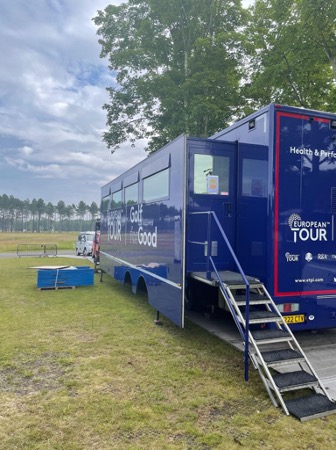Part of the new ‘Gateway to Sport and Exercise Medicine’ blog series
The impact of the pandemic was fully felt by all professional sports, with many events cancelled or postponed. The European Tour Golf normally runs a very full programme throughout the year, with events on most continents (having not quite reached Antarctica yet!). Therefore, when COVID hit in early 2020 the Tour was challenged to adapt.

The implementation of regular PCR and antigen testing, daily health questionnaires, temperature readings, social distancing, and formation of “bubble” systems allowed the Tour to recommence in July 2020, having based it’s return on World Health Organisation risk assessment and best practice principles.
One year later we were fortunate to experience first-hand how they had successfully kept the Tour running throughout the pandemic, working collaboratively with other professional sports to survive and thrive in periods of uncertainty.
Throughout July 2021, we joined the European Tour and The R&A for the UK swing events including the Scottish Open, The Open, The Senior Open and the ISPS HANDA World Invitational. Whilst on Tour, we primarily worked in the COVID testing unit swabbing the public, players, caddies and support staff. Additionally, as aspiring Sport and Exercise Medics, we used this opportunity to gain an insight into this busy lifestyle and shadow some successful sports physicians and trainees.
Testing Procedures
COVID testing began the Sunday before each event. On the first day we would go through Accreditation and then settle into our porta-cabin that would become home for the next week. The first few days on site were generally the busiest, having to PCR test each individual who was entering the inner bubble (players, caddies, families and support staff). Interestingly, some of the players arriving from the US were quite shocked to discover that our testing procedures required a swab of both the nose and throat, often causing some difficult, yet humorous conversations.
The players were then administered a coloured lanyard that allowed them to freely roam outside, but restricted any indoor entry. Once the PCR had been processed by the laboratory, players would receive an email informing them of their result. If the test was negative, players could collect their full accreditation that would allow access to indoor areas. At this point, they would officially have entered the inner bubble, meaning they must stay in pre-set accommodation, eat in designated spaces, and avoid mixing with the public.
Shadowing and Networking
During our time on Tour, we also had the opportunity to shadow some of the medical team, including the Chief Medical Officer, Dr. Andrew Murray, among other consultants, trainees, junior doctors and allied professionals. It was incredibly useful to gain an insight into the busy lifestyle of sport and exercise medicine, particularly during the pandemic, where there are several further considerations, such as adhering to government restrictions (across multiple countries) and dealing with positive cases and their contacts.
We also were able to speak to those who are further on in their training, including Foundation Doctors, Core Trainees and Specialty Trainees. This gave us an insight into the various routes into sports medicine and we were fortunate to receive a wealth of advice to help build our CVs. At the Senior Open, we were invited to join the doctors for a full day of shadowing, where we encountered common problems such as dehydration, diarrhoea and vomiting, paronychia and heatstroke.
Vaccination Clinic

The 149th Open in Kent also offered a unique opportunity to be part of the public health program “Grab a Jab.” This saw 1,635 members of the public getting their COVID vaccination at the pop up clinic on the way to the golf course (1). On the back of this success, a vaccination clinic was set up next to the players lounge, encouraging players, caddies and their support staff, alongside all other staff working at The Open, to receive their 1st or 2nd doses of the vaccine.
Given the busy schedules of the players and their teams, this clinic gave the opportunity to promote the importance of the vaccine and allowed individuals to receive their vaccine and certification at a time that suited them. We were involved in the players clinic helping with admin and generating vaccination certificates. The success of this clinic undoubtedly demonstrated the variety of ways sporting events can be involved in health promotion.
Authors and Affiliations:
Helen Jones, FY1 & James Nelson, 5th Year Medical Student
References:
1.https://www.kentonline.co.uk/sandwich/news/vaccine-centre-at-the-open-gives-1000th-jab-251024/